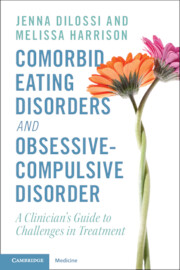 Comorbid Eating Disorders and Obsessive-Compulsive Disorder
Comorbid Eating Disorders and Obsessive-Compulsive Disorder Book contents
- Comorbid Eating Disorders and Obsessive-Compulsive Disorder
- Comorbid Eating Disorders and Obsessive-Compulsive Disorder
- Copyright page
- Contents
- Foreword
- Preface
- Acknowledgments
- Abbreviations
- Part I Overview of the Existing Literature
- Part II Clinical Pitfalls and Treatment Failures
- Part III Evidence-Informed Considerations for Assessment and Treatment
- Chapter 14 Thorough Assessment
- Chapter 15 Collaborative Conceptualization and Treatment Planning
- Chapter 16 Navigating Meal Planning
- Chapter 17 Navigating Self-Monitoring
- Chapter 18 Navigating the Scale & weighing
- Chapter 19 Navigating Body Image
- Part IV Special Topics and Future Considerations
- References
- Index
Chapter 15 - Collaborative Conceptualization and Treatment Planning
from Part III - Evidence-Informed Considerations for Assessment and Treatment
Published online by Cambridge University Press: 14 December 2023
- Comorbid Eating Disorders and Obsessive-Compulsive Disorder
- Comorbid Eating Disorders and Obsessive-Compulsive Disorder
- Copyright page
- Contents
- Foreword
- Preface
- Acknowledgments
- Abbreviations
- Part I Overview of the Existing Literature
- Part II Clinical Pitfalls and Treatment Failures
- Part III Evidence-Informed Considerations for Assessment and Treatment
- Chapter 14 Thorough Assessment
- Chapter 15 Collaborative Conceptualization and Treatment Planning
- Chapter 16 Navigating Meal Planning
- Chapter 17 Navigating Self-Monitoring
- Chapter 18 Navigating the Scale & weighing
- Chapter 19 Navigating Body Image
- Part IV Special Topics and Future Considerations
- References
- Index
Summary
After gathering important information during the assessment process, clinicians can begin working with their patients to collaboratively develop a conceptualization of the patient’s disorder. This early phase of treatment provides an opportunity for clinicians to educate patients about their disorders, including the complex nature of comorbid OCD and EDs, and obtain informed consent for treatment. Informed consent is essential as it ensures that patients understand the treatment options, their potential risks and benefits, and the uncertainty surrounding the best course of treatment for this comorbidity. A functional analysis, which assesses the purpose and function of the patient’s behaviors, can provide valuable data for creating a treatment plan. By understanding the root and function of the patient’s behaviors, it will be possible to prioritize treatment and develop a promising treatment plan. Additionally, it is crucial for clinicians to assess the impact of malnutrition or weight loss on the patient, as this will inform treatment planning and may affect the course of treatment.
Keywords
- Type
- Chapter
- Information
- Comorbid Eating Disorders and Obsessive-Compulsive DisorderA Clinician's Guide to Challenges in Treatment, pp. 95 - 106Publisher: Cambridge University PressPrint publication year: 2023


